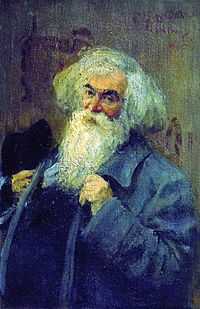Ieronim Yasinsky
| Ieronim Yasinsky | |
|---|---|
|
Portrait by Ilya Repin, 1910 | |
| Born |
30 April 1850 Kharkiv, Russian Empire |
| Died |
31 December 1931 (aged 81) Leningrad, USSR |
| Nationality | Polish, Ukrainian |
| Genre | fiction, memoirs, criticism |
Ieronim Ieronimovich Yasinsky (Russian: Иерони́м Иерони́мович Яси́нский; April 18 (30), 1850 - December 31, 1931) was a Russian novelist, poet, literary critic and essayist, who also published his works under several pseudonyms: Maxim Belinsky, Nezavisimy (The Independent One) and M.Tchunosov.
Biography
Yasinsky was born in Kharkiv, Russian Empire (what is now modern Ukraine) to Ieronim Yasinsky, a nobleman of Polish origins, and Olga Maksimovna Belinskaya, the daughter of a 1812 Borodino hero Colonel Maxim Belinsky (whose name he later used as a literary pseudonym). From the age of eleven, Yasinsky began to write verses and recite them at family literary and musical parties, ultimately resulting in his invariable success.[1]
Yasinsky received a good home education. He continued studying in Chernigov gymnasium until 1868, when he enrolled in Kiev University. However, in 1871, Yasinsky left the university after marrying V.P.Ivanova, a woman with strong ideas on women’s liberation and who would greatly influence Yasinsky. However also in 1871, financial difficulties began to plague the couple; they were not relieved neither by their moving to Saint Petersburg nor by his returning to Chernigov, where from 1873 to 1878, he worked as a state official. In September 1870, Yasinsky debuted as an essayist and started to publish his articles in two newspapers, Kievsky vestnik and Kievsky telegraph. Many of these earlier pieces found their way into The Kiev Stories (1885) collection.[1]
Yasinsky's first short novels (Natashka, 1881; The Sleeping Beauty, 1883) were lauded by the Russian leftist literary elite (Saltykov-Schedrin in particular) and their author was hailed as the new Garshin.[1] Several years later, though, his major novels (Irinarkh Plutarkhov, 1886; The Old Friend, 1887; The Great Man, 1888, and later Under Satan's Cloak, 1909), fell under sharp criticism for allegedly ridiculing the "revolutionary movement" and thus Yasinsky fell out of favour with critics who now saw him as a conservative and jack-of-all-trades type of author. Yasinsky had his own ideas regarding his mission and tried to promote himself as a new "art for arts's sake" figure, whose goal was to "create an encyclopedia of Russian intelligentsia types, as seen in all possible aspects of life". Anton Chekhov, who once characterized Yasinsky as "either an honest garbage collector or a sly crook", was unconvinced. Similarly Maxim Gorky, who treated Yasinsky's books as cheap anti-revolutionary pamphlets, once described their author as "dirty and spiteful old geezer".[1]
Ieronim Yasinsky accepted the 1917 Revolution and even declared himself "a sudden Bolshevik".[2] He worked at Proletkult, edited Soviet magazines (Krasny ogonyok, Plamya, 1918–1919), wrote science fiction for children and even translated Friedrich Engels's poem "The Evening" in 1923, but was still rather unpopular with critics. In retrospect, his memoir The Novel of My Life (1926) was recognised as an insightful and valuable documentation of the Russian literary and cultural life of the late 19th-early 20th century, as were his biographical essays on Saltykov-Schedrin, Garshin, Leykin and Chekhov.[1] He died, aged 81, in Leningrad, USSR.
Selected works
- Natashka (1881)
- The Sleeping Beauty (1883)
- The Kiev Stories (1885)
- Irinarkh Plutarkhov (1886)
- The Old Friend (1887)
- The Great Man (1888)
- Under Satan's Cloak (1909)
- The Novel of My Life (1926)
